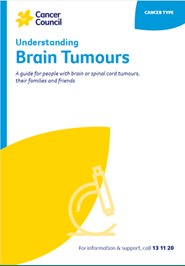Driving
Tumours, seizures, brain surgery and medicines (such as anticonvulsants and some pain medicines) can affect the skills needed to drive safely.
Learn more about:
What skills can be affected?
Skills that can be affected may include:
- good vision and perception
- ability to concentrate and plan
- processing speed and reaction time
- ability to remember directions
- good hand–eye coordination
- planning and problem-solving.
Restrictions on driving
When you are diagnosed with any type of brain tumour, it is very important to ask your doctor how your condition or treatment will affect your ability to drive.
Your doctor will usually advise you not to drive for a while. You probably need to wait for some time before you drive again after surgery and possibly after radiation therapy.
There are also some set exclusion periods your doctor will follow after certain treatments or events such as seizures. If you have had seizures, legally you will need to be seizure-free for a period of time before you are allowed to drive. If you stop taking your anticonvulsant medicines, you will also need to be seizure-free for a period of time until you are allowed to drive.
Before you start driving again, always check with your doctor. Laws in Australia require drivers to let their driver licensing authority know about any permanent or long-term illness or injury that is likely to affect their ability to drive.
Your doctor can tell you if you should report your condition or if there are any temporary restrictions. The licensing authority may ask for information from your doctor to decide if you are medically fit to drive.
See below for some things that may help you return to driving.
How to return to driving
- Have a driving assessment to check your ability to return to driving. This may include doing an off-road assessment or having an electroencephalogram (EEG) to assess seizure risk.
- See an occupational therapist driving assessor, a neurologist or rehabilitation specialist to work out the type of problems you may experience while driving (e.g. a slow reaction time). The focus of the assessment is not to suspend or cancel your licence: it is to work out if it is possible for you to safely return to driving.
- An occupational therapist may be able to teach you driving techniques to help with weaknesses or show you how to make changes to your car (such as extra mirrors). You may also be able to drive with restrictions, such as only in daylight, only in automatic cars or only short distances from home.
- Some people feel upset or frustrated if they have licence restrictions or can no longer drive. You may feel that you have lost your independence or worry about the impact on your family. It may help to talk to a counsellor or someone who has been through a similar experience. Depending on your situation and your health, it may be possible to return to driving later on.
- Follow any licence restrictions. If your doctor says you are not safe to drive, you must not drive unless they change that medical decision. If you ignore the restrictions, your licence may be suspended or cancelled. You may be fined if you drive while your licence has been suspended or cancelled. If you have an accident while driving, you could be charged with a criminal offence and your insurance policy will no longer be valid.
- For more information, talk to your doctor or visit Austroad’s Assessing Fitness to Drive. If you live in NSW, visit NSW Government.
I had a craniotomy for a benign brain tumour, but they couldn’t take all the tumour out. Later I had radiation therapy. Part of the tumour is still there, but it is stable, so I have been able to return to work and I can now drive again.
Debbie
→ READ MORE: Working with a brain tumour
Podcast: Coping with a Cancer Diagnosis
Listen to more of our podcast for people affected by cancer
More resources
Prof Lindy Jeffree, Director of Neurosurgery, Alfred Health, VIC; Caitriona Nienaber, 13 11 20 Consultant, Cancer Council WA; Prof Tamara Ownsworth, Clinical Neuropsychologist and Research Director, The Hopkins Centre, Griffith University, QLD; A/Prof Hao-Wen Sim, Medical Oncologist, The Kinghorn Cancer Centre and Chris O’Brien Lifehouse, NSW; Megan Trevethan, Clinical Specialist Occupational Therapy – Cancer and Lymphoedema Services, Princess Alexandra Hospital, QLD; Chris Twyford, Cancer Specialist Nurse, Canberra Health Services, Cancer and Ambulatory Support, ACT; Dr Adam Wells, Clinical Academic Consultant Neurosurgeon, The University of Adelaide, Royal Adelaide Hospital, SA.
View the Cancer Council NSW editorial policy.
View all publications or call 13 11 20 for free printed copies.

